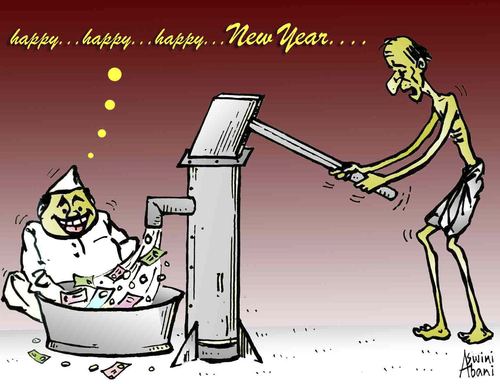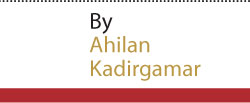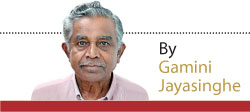Politics in the New Year

 2018-01-01
2018-01-01Three years ago in January 2015, democratic change with the overthrow of the authoritarian Rajapaksa regime was a great moment of hope. For social institutions and movements – the effective guardians of democracy – that moment provided the space to again organise without fear. In some regions such as the post-war North and East, the democratic opening was a change like night and day. People who were afraid to speak during the decades of war and the post-war years, began protesting out on the streets to regain their lands, to remember the disappeared and to demand sustainable livelihoods.

On the other hand, the Government that came to power three years ago has little to show after its first hundred-day programme -- the constitutional amendment reducing the powers of the Executive Presidency was its main achievement. Since then, flawed policies and the infamous bond scandal have marred the first half of the Government’s term.
The Government and the various political parties have not engaged the people on the constitutional political solution process in any meaningful way. The so-called “reconciliation” initiatives have been mainly for the benefit of the Colombo chattering classes and international consumption. Rural disenchantment with the long drought, youth unemployment and rising cost of living are mounting people’s frustrations.
If the current election frenzy reflects the future, there is little reason to believe that the political malaise will turn around in the coming years, particularly with more elections at the provincial and national levels. In this context, at a time when economic problems are mounting, with no meaningful social vision and widespread cynicism about politics, what is the agenda for progressive politics?As the new year dawns, electoral battles are again being waged by the bankrupt political parties, where staying in power or capturing state power to serve the interests of the politicos and their friends is the priority. Local government is about local infrastructure, including access to water, garbage collection, sanitation, rural roads and community facilities, but they are unlikely to be heard in these election campaigns. For the major political actors, whether it is the UNP, the SLFP, the joint opposition or the TNA, local government elections are merely a show of power.
If the current election frenzy reflects the future, there is little reason to believe that the political malaise will turn around in the coming years, particularly with more elections at the provincial and national levels. In this context, at a time when economic problems are mounting, with no meaningful social vision and widespread cynicism about politics, what is the agenda for progressive politics?
Democratic alternative
Historically, elections meant to freely elect representatives, have often led to violence and certainly create a fear of violence. And elections now may seem like a curse than an opening for change. However, elections are a necessary form of legitimisation. Entrenched regimes have been changed and unpredictable moves by voters result in new configurations in control of state power. In the month ahead, as the local government elections gain heat, regardless of whether the campaigns explicitly address people’s issues, there will be an underlying rumbling that will reflect their concerns.
The exercise of the vote, is a historically valuable strength of our society—the first country in Asia to achieve universal suffrage. Furthermore a democratic ethos is instilled in our social institutions. Even when intellectuals have given up on democracy, our people have made historic changes through elections.
Yet that democratic culture in our country is often diverted by the ideological manoeuvres of the nationalists, elite class projects and political patronage. Sinhala Buddhist and Tamil nationalist forces are in fact twin allies that reinforce each other, even as they seek representational control of their respective communities. Next, technocratic economic programmes in the interest of accumulation by the elite often attack social institutions and dispossess people undermining broader democratic participation. And political patronage, characterised by political favours and handouts have ensured a representational structure that does not serve the people, but rather sucks them under its fold.
The challenge then is to create a credible alternative. And that has to begin with ideological battle that critiques nationalism on all sides, and puts forward a social and economic vision meaningful to the people. Next, there is a need to build democratic structures that can ensure the ground up accountability of elected representatives, rather than be diverted by the patronage of those in power.
Such an alternative requires new and rejuvenated political formations. There is a need for progressive political parties such as those that are emerging after prolonged crises around the world; the refreshing wave of new political parties in Southern Europe and the revitalisation of the Labour Party under Jeremy Corbyn are worthy examples. More importantly, we need the revival of our participatory social institutions that are the bedrock of democracy; trade unions, co-operatives and community associations, are some that have proven to be historically significant.
Left politics
Meanwhile, democracy is under attack internationally. Regimes are capturing state power through elections on nationalist and populist platforms. And once in power, they usurp the very democratic rights of the people with authoritarian moves and racist demagoguery.
In the West as in our country, the history of democracy provides some lessons. Geoff Eley’s major work, Forging Democracy: The History of the Left in Europe, 1850–2000 (Oxford University Press 2002), traces how the left movement including trade unions were crucial to the consolidation of democratic rights. Eley shows how the movement for workers’ rights contributed to the formation of democratic rights. This is also true of Sri Lanka’s late colonial and early post-colonial period, where trade unions and then the left parties were the bastion of democratic rights.
At the same time, Eley is forthright in addressing the historical shortcomings of the left movement in not addressing gendered oppression and racism, including within its fold. In Sri Lanka, the left movement’s compromises with majoritarianism and nationalism, signalled its decline. Indeed, in our times, any movement for democracy has to address the social and economic questions including greater redistribution to address inequality, meaningful social protections and sustained decent work. And such democratisation should simultaneously address the rights of minorities, including of women and of oppressed caste communities.
The Govt. that came to power three years ago has little to show after its first 100-day programme -- the constitutional amendment reducing the powers of the Executive Presidency was its main achievement. Since then, flawed policies and the infamous bond scandal have marred the first half of the Government’s termIt would be defeatist to simply dismiss electoral politics as a lost cause. Rather, we have to struggle to find alternatives to set electoral politics on a progressive footing. Trade unions and co-operatives are accused of capture by politicos through patronage.
Where that is true, the point is not to reject trade unions and co-operatives, but to strengthen them to determine electoral politics in the interest of their members and the public. The hard political road ahead is not going to be cleared by the political leaders that are the subject of much media musings and elite gossip, rather, it is about finding an alternative vision, revitalising social institutions and encouraging the democratic participation of the people.





















As polls campaign begins, Sirisena brings bribery and corruption to the fore